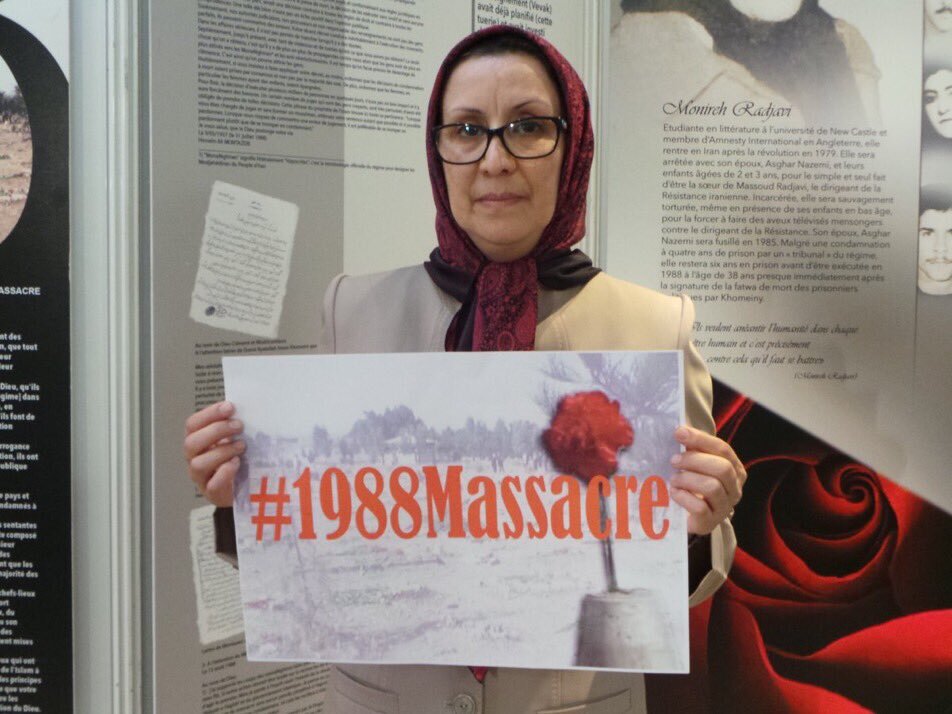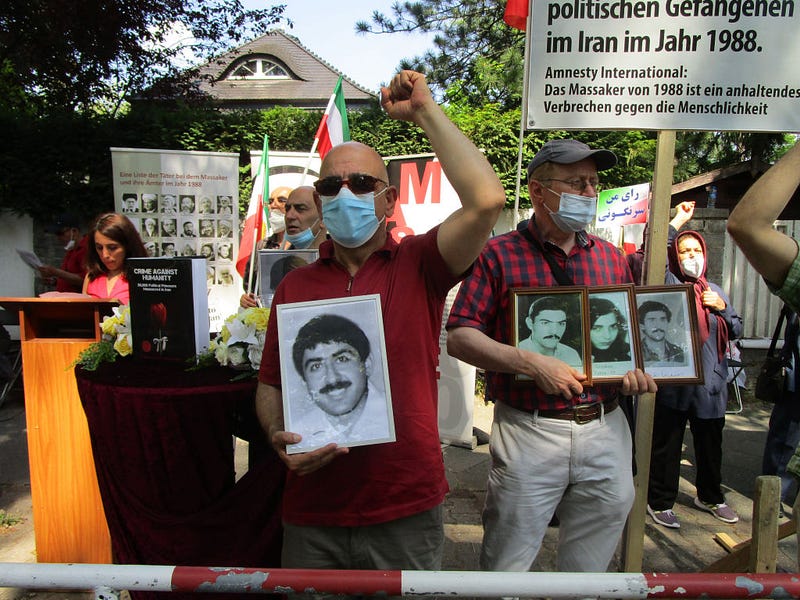Farideh Goudarzi beamed with pride as she held up a photo of her son Iman, a slight young man sporting a white martial arts uniform.
“This is when he was a university student. He was one of the champions of the country in Taekwondo,” she told me over a video call. “But in the end, on the charge of wanting freedom, he was put in prison. He got a five year sentence, so we had to escape the country. What I feared was that he would face the same consequences as his father.”
Behzad Afsahi, Goudarzi’s husband and Iman’s father, was among the early victims of the Islamic Republic of Iran’s 42-year campaign of political violence against its own populace. “After 11 months of torture, imprisonment, and being lashed, they took him to the courtyard of the court in Hamedan, where alongside four other prisoners he was hanged using a construction crane,” Goudarzi said.
In the fight for Iran’s separation from mullah rule after the 1979 revolution, Goudarzi’s brother, sister, and countless friends and acquaintances met a fate similar to her husband’s—one which she only narrowly eluded herself. In 1983, and in the final days of her third trimester, Goudarzi was seized by regime authorities, taken to northwest Iran’s Hamedan Prison, and confined to a three-by-four meter torture chamber for “questioning.”
Goudarzi recalls the ensuing interrogation and flogging by Iranian officials—the first of many that would take place over the course of her six-year captivity—as her earliest encounter with Ebrahim Raisi, then-chief prosecutor of Hamedan.
After her release, Goudarzi went on to raise her son and advocate for justice on behalf of those who perished. Meanwhile, Raisi, her tormentor, rose through the ranks of Tehran’s political elite for his unmatched brutality and aptitude for stamping out dissent. He now stands out as the clear frontrunner in today’s Iranian presidential election.
When Iranian citizens (those who aren’t boycotting the election, that is) cast their ballots, they’ll see the names of a handful of hardliners to replace current President Hassan Rouhani. But despite the mirage of choice, Raisi’s elevation to office has very likely been pre-decided for voters—through mass disqualifications, state-run media support, last-minute rule changes, pressured withdrawals, and behind-the-scenes favors from Supreme Leader Ali Khamenei himself.
On the campaign trail, the 60-year-old chief justice and draconian cleric wages a war of populism against his opponents, marketing himself as an anti-corruption reformer intent on restoring the economy and rooting out the un-Islamic, Western forces responsible for the country’s decline. Other, more obscure agenda items—like the government-sponsored promotion of arts and culture—have also made their way into Raisi’s platform.
But to opponents of the regime, the hardliner’s presidential “selection” is designed to send one clear and singular message to the people of Iran: Cease dissent or become one of many in Raisi’s long line of political victims.
During his two years at the helm of Iran’s judiciary, Raisi has expanded the scope of the death penalty, wielding the sentence as a tool of repression against dissenting political voices and ethnic and religious minorities. According to Amnesty International, Iran is now second only to China in absolute number of executions. In a high-profile case from last year, authorities executed Navid Afkari—a well-known Iranian wrestler and participant in the 2018 anti-government protests—for confessions obtained under sustained torture.
But Raisi staked his claim to notoriety long before he became involved in national politics. As prosecutor of Hamedan, he led his province in the torture and execution of thousands of political prisoners in the 1980s. Between July and December 1988, the state carried out the systematic killings of dissidents, activists, militants, mothers, and children imprisoned across Iran. Hussein-Ali Montazeri, deputy supreme leader-turned-dissident, named Raisi as one of the four officials intimately involved.
Estimates vary, but reports indicate that more than 30,000 prisoners were extrajudicially killed over the course of only five months, the majority of whom belonged or had ties to the People’s Mujahedin Organization of Iran (often abbreviated as “MEK,” borrowing from the Farsi transliteration). Goudarzi’s family members were among them, and she and her son have remained active in the organization in the years since their release.

After a failed military offensive by the group—which fought alongside the Islamic Republic to overthrow the shah but broke from Ayatollah Khomeini’s repressive clerical rule—the supreme leader issued a fatwa, an Islamic religious decree, ordering the execution of MEK affiliates. By most accounts, the MEK’s attack and decisive defeat provided Khomeini with convenient pretense to remove the thorn in his side, ordering the massacre as part of a broader pattern of violence that began in 1981 after the mullahs consolidated power.
A group of United Nations human rights experts issued a joint letter calling on the Iranian government to launch an investigation into the slaughter of 1988 last year, but a formal commission of inquiry has never been established and the killings’ perpetrators have yet to be held to account.
As American and Iranian negotiators continue indirect talks to revive the 2015 nuclear deal, the added dynamic of a virulently anti-West (and recently sanctioned) president representing Iran on the world stage could complicate things.
“Rouhani had an existing international network of contacts, because he was the chief nuclear negotiator when Mohammad Khatami was president and he was secretary of the supreme national security council,” Jason Brodsky, senior Middle East analyst and editor at Iran International, told The Dispatch. “Dealing with Ebrahim Raisi is going to be much more difficult than it was under Rouhani, because of the baggage that he brings to the presidency.”
So why then, when the Islamic Republic desperately needs sanctions relief by way of a restored agreement, would it further the bid of an unpalatable candidate? Experts have a couple theories.
The first is that Khamenei understands that the U.S. administration’s ambitions to curb Iranian nuclear proliferation—which in its view a return to some version of the 2015 Joint Comprehensive Plan of Action achieves—will remain undeterred regardless of who holds the office in Tehran. “I think [Khamenei] feels that he can install someone in the position with Ebrahim Raisi’s record and remain confident that sanctions relief is coming,” Brodsky said. “He no longer needs someone who can relate more to Western audiences in this position.”
“The thing with Biden’s team is that they are so desperate for a deal that they will find a silver lining no matter how imaginary it is,” Michael Rubin, a former Pentagon official and resident scholar at the American Enterprise Institute, told The Dispatch. “Raisi can tell them that Iran will build nukes and bomb Tel Aviv, and [special U.S. envoy for Iran] Rob Malley would report that as ‘Raisi’s team promised me that he wouldn’t nuke 99.9 percent of the planet, so clearly he wants to talk!’”
Some anticipate that the administration might move to finalize a deal after the election but before Raisi takes office, sparing itself the optics of negotiating with a killer but extending Tehran economic reprieve nevertheless.
The second rationale for endorsing Raisi, evidenced by the regime’s anticipation of record low voter turnout today, is the Islamic Republic’s plummeting legitimacy in the eyes of its own populace. With a proven track record quelling dissent and putting down uprisings, Raisi is the clear choice to sustain the 82-year-old Khamenei’s rule during his life and ensure a stable transition of power to the next supreme leader after his death.
“The inner circle of power in the Islamic Republic is shrinking. We’ve seen that with the disqualification of Ali Larijani, who was the longest-serving speaker of parliament since 1979,” Brodsky explained. “It shows that Khamenei is consolidating his authority and his control over the system as he approaches the end of his life.”
“Raisi has checked all the boxes. He has religious credentials,” Rubin said. “As the 1988 prison purge shows, he has shown himself unwavering and uncompromising in pursuit of enforcing the most hardline interpretations, even at the point of a gun.”
Tehran faced major demonstrations in 2018, 2019, and 2020—each of which began amid economic grievances but quickly grew into broader calls for regime change. As strikes afflicting various corporate sectors—from nursing, to teaching, to oil production—crop up across the country, the mullahs are eager to avoid another mass demonstration. During the last, authorities killed more than 1,500 protesters in less than two weeks.
“That’s why Raisi is the preferred candidate of the supreme leader today, because the MEK has social bases in Iran today and he is needed to crack down on them,” said Goudarzi, who supports the movement from its headquarters in Albania. “Despite 43 years of crackdown, torture, and executions, the country’s youth are still drawn to this organization.”
The opposition within Iran, which MEK leadership refers to as “resistance units,” purports to be responsible for the channeling of broader unrest into explicit challenges to the clerical government. One slogan spanning different social classes, locales, and years—“دشمن ما همینجاست. دروغ میگن آمریکاست” or, “They are lying that our enemy is America, our enemy is right here”—has resurfaced on Iranian Twitter ahead of the election.
“We have one request for the Western governments, which is to end the dirty policy of appeasement and negotiations with the mullahs’ regime—and for them to stop looking for so-called moderates within this regime. Raisi is the true representation of the entire Islamic Republic,” Goudarzi said. “In this battle that is going on between our people and the mullahs’ regime, we ask the Western governments to stand on the side of the Iranian people. Because our nation will never forget, nor forgive, those who murdered their children.”







Please note that we at The Dispatch hold ourselves, our work, and our commenters to a higher standard than other places on the internet. We welcome comments that foster genuine debate or discussion—including comments critical of us or our work—but responses that include ad hominem attacks on fellow Dispatch members or are intended to stoke fear and anger may be moderated.
With your membership, you only have the ability to comment on The Morning Dispatch articles. Consider upgrading to join the conversation everywhere.